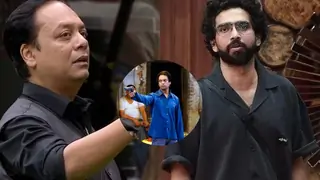Immortalised by his dance
He was neither handsome nor was he a great thespian. But audience loved Bhagwan, who passed away recently.
Bhagwan Dada... his fans adored him.
WAY BACK in 1952, I watched ''Albela" at a theatre in Cochin. The packed housecontinuously cheered the hit numbers like ''Shola jo bhadke" and ''O Betaji." More than 35 years later, I saw the same film at one of its revivals in a Mumbai theatre.
The reaction was the same. The audience stood on their chairs, danced at the aisles, whistled and cheered. Who says trends in Hindi film music change periodically? Not if the music score was like that of ''Albela." Bhagwan, the hero, who was also the producer-director of the film, was short, bulky and no Rudolph Valentino.
The story and screenplay could have been taken out of his own life, the struggles of a young man who was determined to make it in show business. ''Albela" had to contend with some outstanding musicals of that era - ''Anarkali," ''Awara," ''Aah," ''Aan" and so on. These films were made by big banners and boasted of an impressive star caste. Yet ''Albela" which outscored them all, had just one star, the svelte and slim Geeta Bali. What could have prompted her to play heroine to Bhagwan? Perhaps, her sixth sense told her that the film would be a major hit. Bhagwan Dada who was 89 died in Mumbai last Monday. He had been ill for several years and the final years were difficult.
Once the proud owner of bungalows, a fleet of cars, Bhagwan lived in a dirty chawl in the working class area of Parel. In his heyday, he was always surrounded by hundreds of chamchas but there was hardly anyone at his bedside when the end came. Several times during the past five years, he turned down this writer's request for an inteview. Perhaps, he did not want the media to intrude into his privacy and expose his degradation. After ''Albela" he had lived like a king. But his other films like ''Jhamela" and ''Labela" flopped and the industry thrust him aside.
He was reduced to play bit roles in all sorts of films. But his dancing technique never died. Amitabh Bachchan revived it in most of his films. It consisted of halt and move steps with hands swaying alternately forward and backward. Amitabh confessed that with his extra-long legs, he had always found dancing difficult. ''It was after I watched Bhagwan Dada dancing in that typical style of his, that I decided to dance like him,'' explained the super star.
Dance director Farah Khan referred to the rolling of eyes, the slight ''jhatka" and those little ''matkas" which were the trademarks of Bhagwan dada style of dancning.
They went well with the jazzy tunes like ''Shola jo bhadke, dil mera dhadke." Stunt actor, dancing hero, then bit player, that was the story of Bhagwan, who must have acted in more than 400 films, mostly Hindi, some Marathi. Son of a mill worker, he was dazzled by the stage and the theatre, and like Bhola in ''Albela" sought stardom and achieved it after a long, hard struggle. Mind you, he was neither handsome nor a great thespian. But audiences loved him because, like them, he played the ''fall guy" in many films and ultimately made it good. ike Raj Kapoor, he had an ear for music. C. Ramchandra was his close friend and had scored the music for dozens of his films under the names, Anna Saheb and Ram Chitalkar.
But came ''Albela", Ramchandra used his own name. It was said, he did the music score for love and also sang quite a few songs in the film. The orchestration was brilliant. Who can forget ''O Betaji, arre O Babuji" where the background music was created from kitchen utensils. Bhagwan was the common man's hero. The fans were more faithful to him than his so-called friends, who sucked up to him during his days of glory and turned their backs when he fell on bad times. That was the theme of many of his films. Dada is no more but ''Albela" and its songs will live forever.
V. GANGADHAR
Edited by Qwest - 18 years ago
 Just a hint of the tune, and your feet move instantly. In a manner - the rolling of eyes, the slight jhataks and those little mataks - that is so typical of the most famous male dancer in the Hindi film industry. And if you think the reference here is to Aby Baby alias Amitabh Bachchan, you've need to have a second thought coming. 'Cause the AB style of dance is not new - or unique. Bachchan was inspired into creating his dance style after he watched a short, fat, round actor move easily, in perfect syncronisation to the music of the moment. Bhagwan's style of dance was so effervescent, the audience could not help following his tune. Be it 1952, 1962 or 1992, the impact of the songs - especially of Shola jo - from his film Albela have not changed. I first saw the film, somewhere in the 1950's, at a theatre in Fort Cochin. Twenty years later, I saw it again. This time, it was a morning show at Bombay's Apsara cinema. And, in both theatres, the reaction was the same. The enthused audience whistled, clapped its hands, stood on the seats and generally went berserk as the lively, melodious tunes of Albela filled the hall. This is one movie that has stood the test of time. To date, its music is a must at every Indian celebration. And urban youngsters, who are normally used to gyrating to Michael Jackson, still boogie enthusiastically to Shola jo bhadke at various discotheques. Albela was the brainchild of ace comedian-dancer Bhagwan. In the days when he was a much sought-after member of Hindi filmdom, Bhagwan would spend a lot of time with his close pal, music director C Ramachandra. The duo would while away the hours listening to music or to Chitalkar playing the harmonium. Eventually, it would be Chitalkar and an up-and-coming Lata Mangeshkar who would record one of the all-time favourites songs of Hindi cinema - Shola jo bhadke, dil mera dhadke. Ramachandra, who was already a famous figure in the film world, was also a very outspoken person. And he hounded Bhagwan make a film with a social theme. "I will help you," he promised. "The world will never be able to forget the music I will provide for your film." Seated in a restaurant at Churchgate, they discussed the plot of the film. And decided that the film would contain at least a dozen memorable songs. Till then, Bhagwan had just been another filmmaker - the creation of a wide-eyed child who was fascinated by the magic of silent cinema. Even though he had his origins in the labour-dominated areas of Parel and Dadar, even though he did not know where his next meal was coming from, Bhagwan always managed to scrounge around for the seven annas that he needed to watch a film and eat some channa. Little Bhagwan adored Master Vittal, one of the more popular heroes of the silent era. Though his movies were mainly stunt-oriented, Bhagwan was transported into a world of his own, into a world that was far away from his poverty-infested real world. Forced to give up studies after the fourth standard, Bhagwan did a lot of odd jobs. In between, he would work out at the local gym in order to improve his physique. His aim was clear - he wanted to join the film industry.
Just a hint of the tune, and your feet move instantly. In a manner - the rolling of eyes, the slight jhataks and those little mataks - that is so typical of the most famous male dancer in the Hindi film industry. And if you think the reference here is to Aby Baby alias Amitabh Bachchan, you've need to have a second thought coming. 'Cause the AB style of dance is not new - or unique. Bachchan was inspired into creating his dance style after he watched a short, fat, round actor move easily, in perfect syncronisation to the music of the moment. Bhagwan's style of dance was so effervescent, the audience could not help following his tune. Be it 1952, 1962 or 1992, the impact of the songs - especially of Shola jo - from his film Albela have not changed. I first saw the film, somewhere in the 1950's, at a theatre in Fort Cochin. Twenty years later, I saw it again. This time, it was a morning show at Bombay's Apsara cinema. And, in both theatres, the reaction was the same. The enthused audience whistled, clapped its hands, stood on the seats and generally went berserk as the lively, melodious tunes of Albela filled the hall. This is one movie that has stood the test of time. To date, its music is a must at every Indian celebration. And urban youngsters, who are normally used to gyrating to Michael Jackson, still boogie enthusiastically to Shola jo bhadke at various discotheques. Albela was the brainchild of ace comedian-dancer Bhagwan. In the days when he was a much sought-after member of Hindi filmdom, Bhagwan would spend a lot of time with his close pal, music director C Ramachandra. The duo would while away the hours listening to music or to Chitalkar playing the harmonium. Eventually, it would be Chitalkar and an up-and-coming Lata Mangeshkar who would record one of the all-time favourites songs of Hindi cinema - Shola jo bhadke, dil mera dhadke. Ramachandra, who was already a famous figure in the film world, was also a very outspoken person. And he hounded Bhagwan make a film with a social theme. "I will help you," he promised. "The world will never be able to forget the music I will provide for your film." Seated in a restaurant at Churchgate, they discussed the plot of the film. And decided that the film would contain at least a dozen memorable songs. Till then, Bhagwan had just been another filmmaker - the creation of a wide-eyed child who was fascinated by the magic of silent cinema. Even though he had his origins in the labour-dominated areas of Parel and Dadar, even though he did not know where his next meal was coming from, Bhagwan always managed to scrounge around for the seven annas that he needed to watch a film and eat some channa. Little Bhagwan adored Master Vittal, one of the more popular heroes of the silent era. Though his movies were mainly stunt-oriented, Bhagwan was transported into a world of his own, into a world that was far away from his poverty-infested real world. Forced to give up studies after the fourth standard, Bhagwan did a lot of odd jobs. In between, he would work out at the local gym in order to improve his physique. His aim was clear - he wanted to join the film industry.  Finally, he got his chance in 1930. After years of haunting the studios in the hope that he would some day be discovered, producer Siraj Ali Hakim gave him a small role in the silent film, Bewafa Aashiq. Bhagwan was so thrilled, he refused to leave the studio even after his work was completed. Nor was he ready to leave the studio even when it was time to shut down the sets for the day. He quickly learnt all the aspects of film-making, even as he continued to act in a series of stunt film like Bahadur Kisan, Criminal and so on. Meanwhile, more and more people started expressing an interest in financing films. There was a demand for directors and Bhagwan was more than willing to try his hand. Soon, he was wielding the megaphone for limited-budget films. "I made films for less than Rs 65,000" he recalls. "These were the kind of films where the director had to design costumes and even arrange meals for the unit. But it was worth it." His film could not be acclaimed as great, but they were profitable ventures. The period saw a spate of action films, including Bhagwan Dada's Dosti, Jalan and Bhedi Bangala. Bhagwan was as popular a star as Fearless Nadia, and the crowds thronged the theatres for their films. But the trend was changing, a fact that was pointed out to him by Raj Kapoor. "Dada," he urged, "zamana badal gaya hai. Social picture banao." The result was Albela - a film that was in tune with newly independent India. Both the young and the old loved it. It ran for more than 50 weeks at the theatres where it was shown. At some places, the collections even surpassed Raj Kapoor's Barsaat. It was to join the ranks of Sholay, Mother India and Ganga Jamuna as a landmark in Hindi cinema. Albela was a simple, uncomplicated movie. A poor man (Bhagwan) from an orthodox family dreams of becoming a kalakar. His family is indifferent to his ambitions, the people who know him poke fun at his aspirations. Until the day he comes in contact with a well known female singer, portrayed by the popular Geeta Bali. The singer recognises the tremendous talent and never-say-die spirit of the hero and encourages him. Very soon, they become a famous singing pair. Romance blossoms between the pair and the film ends on an all's-well-that-ends-well note.
Finally, he got his chance in 1930. After years of haunting the studios in the hope that he would some day be discovered, producer Siraj Ali Hakim gave him a small role in the silent film, Bewafa Aashiq. Bhagwan was so thrilled, he refused to leave the studio even after his work was completed. Nor was he ready to leave the studio even when it was time to shut down the sets for the day. He quickly learnt all the aspects of film-making, even as he continued to act in a series of stunt film like Bahadur Kisan, Criminal and so on. Meanwhile, more and more people started expressing an interest in financing films. There was a demand for directors and Bhagwan was more than willing to try his hand. Soon, he was wielding the megaphone for limited-budget films. "I made films for less than Rs 65,000" he recalls. "These were the kind of films where the director had to design costumes and even arrange meals for the unit. But it was worth it." His film could not be acclaimed as great, but they were profitable ventures. The period saw a spate of action films, including Bhagwan Dada's Dosti, Jalan and Bhedi Bangala. Bhagwan was as popular a star as Fearless Nadia, and the crowds thronged the theatres for their films. But the trend was changing, a fact that was pointed out to him by Raj Kapoor. "Dada," he urged, "zamana badal gaya hai. Social picture banao." The result was Albela - a film that was in tune with newly independent India. Both the young and the old loved it. It ran for more than 50 weeks at the theatres where it was shown. At some places, the collections even surpassed Raj Kapoor's Barsaat. It was to join the ranks of Sholay, Mother India and Ganga Jamuna as a landmark in Hindi cinema. Albela was a simple, uncomplicated movie. A poor man (Bhagwan) from an orthodox family dreams of becoming a kalakar. His family is indifferent to his ambitions, the people who know him poke fun at his aspirations. Until the day he comes in contact with a well known female singer, portrayed by the popular Geeta Bali. The singer recognises the tremendous talent and never-say-die spirit of the hero and encourages him. Very soon, they become a famous singing pair. Romance blossoms between the pair and the film ends on an all's-well-that-ends-well note.  Bhagwan, obviously, was nobody's heart-throb. Portly and slow moving, he could not compare with the heroes of his day like Raj Kapoor, Dilip Kumar or Ashok Kumar. But he was ideally cast as the simpleton who loved music and singing and was determined to make a mark. The rest was history. The film became a super hit, Bhagwan had everything he had dreamt of - money, fame, friends, luxury. Unfortunately, he turned out to be a 'one-hit' wonder. He made Labela and Jhamela. Both films failed miserably at the box office. With failure came some bitter lessons. His large circle of friends, who lived at his expense, deserted him. He was forced to adopt a more austere way of life, to sell his cars and bungalow. Everything changed, except his addiction to movies. Initially, Bhagwan was offered good roles in films like Mister Lambhoo and Bhagambaag. Soon, though, he only got bit roles. It became difficult to run the household. But Bhagwan was not worried; after all, he had been born and brought up in poverty. Besides, Bhagwan could not adapt himself to the needs of modern-day Hindi cinema. Nor did he believe in looking back. Nostalgia was of no use to him. Similarly, he was not worried about the future. "Jo hoga," he shrugs, "wohi hoga." Today, there are no bungalows. Or cars. Or close friends. Instead, the 80-something Bhagwan lives in a chawl in suburban Dadar, Bombay. His house is poorly furnished. But it is still the same house where music director Ramachandra, actor Om Prakash, lyricist Rajinder Krishan and others spent long hours weaving dreams of great movies, wonderful roles and lilting tunes. Photographs : Courtesy Kamat Foto Flash
Bhagwan, obviously, was nobody's heart-throb. Portly and slow moving, he could not compare with the heroes of his day like Raj Kapoor, Dilip Kumar or Ashok Kumar. But he was ideally cast as the simpleton who loved music and singing and was determined to make a mark. The rest was history. The film became a super hit, Bhagwan had everything he had dreamt of - money, fame, friends, luxury. Unfortunately, he turned out to be a 'one-hit' wonder. He made Labela and Jhamela. Both films failed miserably at the box office. With failure came some bitter lessons. His large circle of friends, who lived at his expense, deserted him. He was forced to adopt a more austere way of life, to sell his cars and bungalow. Everything changed, except his addiction to movies. Initially, Bhagwan was offered good roles in films like Mister Lambhoo and Bhagambaag. Soon, though, he only got bit roles. It became difficult to run the household. But Bhagwan was not worried; after all, he had been born and brought up in poverty. Besides, Bhagwan could not adapt himself to the needs of modern-day Hindi cinema. Nor did he believe in looking back. Nostalgia was of no use to him. Similarly, he was not worried about the future. "Jo hoga," he shrugs, "wohi hoga." Today, there are no bungalows. Or cars. Or close friends. Instead, the 80-something Bhagwan lives in a chawl in suburban Dadar, Bombay. His house is poorly furnished. But it is still the same house where music director Ramachandra, actor Om Prakash, lyricist Rajinder Krishan and others spent long hours weaving dreams of great movies, wonderful roles and lilting tunes. Photographs : Courtesy Kamat Foto Flash 






























